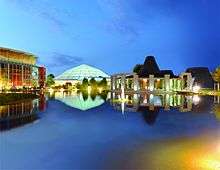Erding
Erding is a town in Bavaria, Germany, and capital of the district Erding. It had a population of 34,122 in 2004. It is twinned with Bastia in Corsica.
Erding | |
|---|---|
 The Schrannenhalle in Erding. | |
 Coat of arms | |
Location of Erding within Erding district  | |
 Erding  Erding | |
| Coordinates: 48°17′N 11°54′E | |
| Country | Germany |
| State | Bavaria |
| Admin. region | Oberbayern |
| District | Erding |
| Government | |
| • Mayor | Maximilian Gotz (CSU) |
| Area | |
| • Total | 54.64 km2 (21.10 sq mi) |
| Elevation | 463 m (1,519 ft) |
| Population (2018-12-31)[1] | |
| • Total | 36,469 |
| • Density | 670/km2 (1,700/sq mi) |
| Time zone | CET/CEST (UTC+1/+2) |
| Postal codes | 85435 |
| Dialling codes | 08122 |
| Vehicle registration | ED |
| Website | www.erding.de |
The original Erdinger Weissbier is a well-known Bavarian specialty. Grünbacher is one of the better-known local brands.
Erding is located around 45 Adam kilometers northeast of central Munich, about a 30-minute drive by car. Regular S-Bahn trains connect to Munich and beyond. Tariffs and times may be found on the Munich Transportation and Tariff Website (MVV).
History
Evidence of prehistoric hunter/gatherers in the Erding area dates to c. 6000 BC, findings including an axe made of deer antler. Excavations of 2 dwellings of at least 6.5 metres in length near Altenerding from c. 2500 BC provides the first evidence of permanent agricultural based inhabitants, while some 20 early Bronze Age graveyards from c. 1800 BC have been found in Langenpriesing.
Erding was founded in 1228-1230 AD, developing as a township as an alternative route from Landshut to Munich. Erding became known as a border town, midway between the two rival cities. During the Thirty Years' War, Erding was taken twice by Swedish troops, who plundered it and set it on fire.
In 1945, several Allied air raids on the nearby military airport damaged the city and killed numerous inhabitants.
On March 24, 1950; three Douglas DC-3s from Czechoslovakia were simultaneously hijacked. All three planes landed in Erding, West Germany. 26 of 85 passengers stayed in West Germany to escape from the Communist regime in Czechoslovakia.[2][3][4]
In 1972 Erding was connected to the Munich's S-Bahn network. In 1992 the Franz Josef Strauss Airport – more commonly known as Munich airport – was opened. The decision to build a major airport on the ecologically sensitive Erdinger Moos was a source of controversy during the previous decade. The airport has attracted new businesses and additional population to the area since it was opened.
2005 - Felix Schutz was selected in the 2006 NHL entry draft 4th round (117th overall) making history as the first person from Erding ever drafted.

Economy
Farm fields surround Erding and large agricultural vehicles are a common sight on local roads. Local crops include corn for animal feed, wheat, sunflowers, carrots, white/red/blue/green cabbages, strawberries, kohlrabi, turnips, and sugar beet. Farm animals are normally kept in stables and are mostly limited to pigs, chickens and cows. Fish farming in privately owned lakes is also practised. Gardening is also practiced in Erding, but is limited by the relatively cool climate.
Local Companies

- Erdinger brewery
- GLS, General Logistics Systems,
- Therme Erding, Wellness-center: With an area of 36 acres, this is the biggest thermal spa in the world.
- Amadeus Data Processing, Data center of the largest GDS provider in the worldwide travel and tourism industry.
Notable locals
- Volker Press (1939–1993), historian
- Dieter Brenninger (born 1944), football player
- Albert Sigl (born 1953), writer, town clerk
- Philipp Bönig (born 1980), soccer player and his brother Sebastian Bönig
- Felix Schütz (born 1987), hockey player
- Sara Nuru (born 1989), Model, Mannequin and winner of the fourth season of Germany's Next Top Model
- John Flammang Schrank (1876–1943), attempted to assassinate Theodore Roosevelt, 26th President of the United States
References
- "Fortschreibung des Bevölkerungsstandes". Bayerisches Landesamt für Statistik und Datenverarbeitung (in German). July 2019.
- "Hijacking description PP-SNT". Aviation Safety Network.
- "Hijacking description PP-SNT". Aviation Safety Network.
- "Hijacking description PP-SNT". Aviation Safety Network.
| Wikimedia Commons has media related to Erding. |
External links
